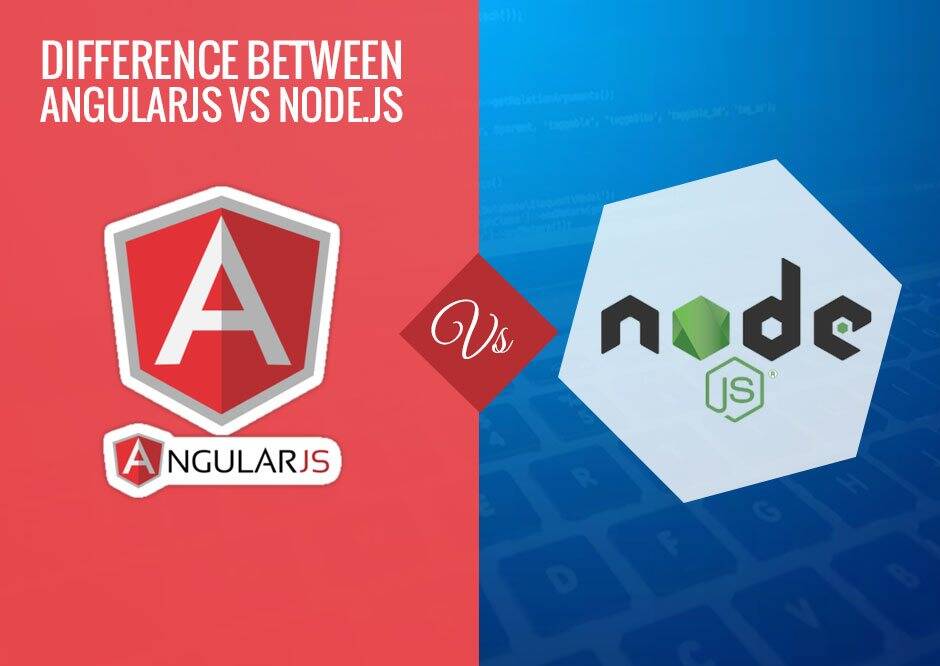Table of Contents
ToggleAngularJS VS NodeJS
What is AngularJS?
AngularJS development is a modern-day web application framework, which helps you develop single-page applications. Being an open-source web framework it is mainly maintained and worked by Google. It first reads the Hypertext Markup Language (HTML) page which already possesses some custom tag attributes in it. This further interprets those attributes as directives to bind its input/output functions which finally represent it by standard JavaScript variables. AngularJS programming helps you design your codes in a much simpler way reducing all the complexities. This full-featured JavaScript framework gets all the supportive ideas from Google and other wide community forums to keep it up to date. With the primary goal of simplification, it gives all the users a rich and responsive experience of use.Advantages of Angularjs:
The following are some important benefits of utilising Angular for front-end web development:- Angular developers use TypeScript programming language. It is a superset of JavaScript that includes static type checking and other capabilities to make big and complicated web applications easier to create.
- Angular features a component-based design. Making it simple to create and manage sophisticated user interfaces.
- Angular has a number of features and tools that make it simpler to design and maintain big online web applications. It includes dependency injection, routeing, and data binding.
- Unit testing is well supported in Angular for developers. It is easy to guarantee that your code is valid and maintainable.
Hire AngularJS Developer for your Web Development within 1 hr
What is Node JS?
Node JS, however, is an open-source cross-platform, built on Google Chrome’s JavaScript Engine. Its easy building operation makes its network applications faster and more scalable. Similar to the AngularJS language, the code of Node JS is also very fast and easy to execute. The Nodejs server-side application engine is based on the JavaScript V8 engine used in Google Chrome. It allows you to write fast and efficient applications. For building fast and scalable network applications Node JS uses an event-driven, non-blocking I/O models. It makes it lightweight and more efficient, perfect for data-intensive real-time applications that run across distributed devices.Advantages of Nodejs:
The following are some important benefits of utilising Node.js for server-side development:- Node.js lets you utilise JavaScript for server-side development. It can make building server-side apps easier for web developers who are already comfortable with JavaScript.
- This allows you to create full-stack web apps using JavaScript. It simplifies development and eliminates the need for distinct front-end and back-end teams.
- Node.js is based on the same V8 JavaScript engine as Google Chrome. As Node.js has a huge and active community, it is simple to get assistance, libraries, and tools for working with it.
- It has an event-driven, non-blocking I/O mechanism. Making it efficient and scalable for web applications with many concurrent connections.
- Node.js allows you to create lightweight and scalable server-side applications. It might be beneficial for constructing microservices or other distributed systems.
Hire NodeJS Developer for your Web Development within 1 hr
Comparing Features Between Angular & Node:
-
Core Architecture:
-
Web Framework:
-
Installation:
-
Important Features:
-
Working with Data:
-
Programming Language and Paradigm Support:
-
Use Cases:
Difference between Angular vs Node
Read More: Asp.NET vs Node JS
AngularJS vs NodeJS: Which is Better for Web Development?
AngularJS and NodeJs both have their own strengths and uses, which makes it difficult to decide which is better for web development. As a runtime environment for JavaScript, NodeJs lets you run JavaScript outside of a web browser. Making it useful for building back-end APIs and other server-side applications. A component-based architecture and TypeScript programming language. Used to build single-page web applications in AngularJS a front-end web development framework. Ultimately, your specific needs and goals will determine what technology to use. AngularJS may be a better choice if you’re building a complex single-page web application. Whereas NodeJS might be a better choice if you’re building a server-side application or API. You should also consider the programming language and framework you want to use. Each of these technologies has its own strengths and weaknesses. Hope you like this blog on Angular vs Node. Do check our other blog. You can contact us at enquiry@nimapinfotech.com if you are looking to hire developers or click on the banner below.
Author
-

A technology enthusiast with over 14+ years of hands-on experience in the IT industry, I specialize in developing SaaS applications using Microsoft Technologies and the PEAN stack. I lead a team of 300+ engineers, holding multiple Microsoft certifications (MCSD, MCTS, MCPS, MCPD). My expertise spans across C#, ASP.NET, NodeJS, SQL Server, and Postgres.
View all posts








